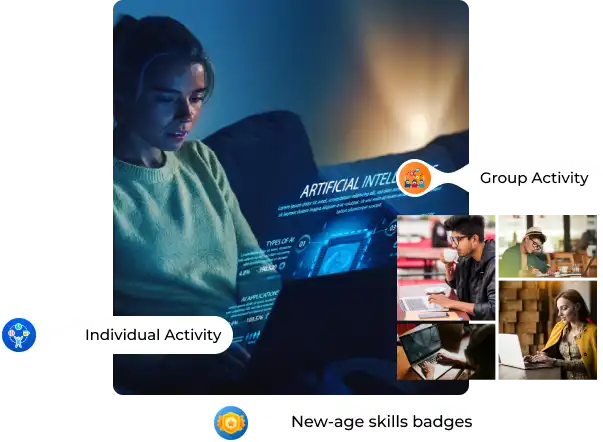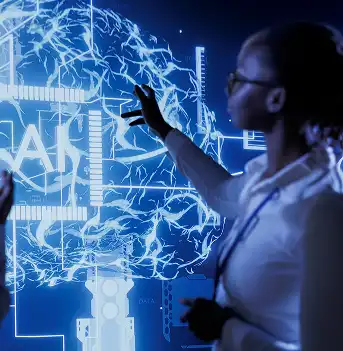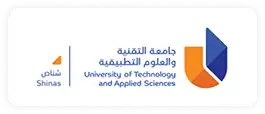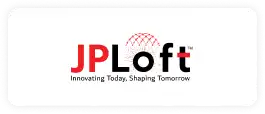SIMD
Take Charge of Your Learning
Take full control of your learning journey with guided self-awareness, reflection, and goal-setting strategies.

Discover the best learning methods tailored to your Learning Style, Goals, Language Proficiency, Difficulty Level and Subject Content.

Anytime, Anywhere, Any subject
This user manual is your step-by-step guide to navigating YMetaconnect, designed to help learners, mentors, and institutions achieve better outcomes.
From setting up your learning dashboard to tracking progress using RAR and SIMD tools, this guide will walk you through everything you need to make the most of YMetaconnect’s personalized learning environment.



Students, professionals, and individuals can prepare for school, university, and competitive exams, explore job and placement opportunities, connect with peers, and reflect on their growth.


Teachers, professionals, and trainers can design engaging learning content, track learner progress, connect with a global audience, and earn rewards based on the success of their courses.


Companies, universities, schools and institutions can engage with emerging talent, support learning initiatives, and identify skilled individuals for collaboration, internships, or job opportunities to learners.
We enhance self-regulation through the R-A-R AI Tool™ and the Self-Instructional Metacognitive Developer™, empowering deeper learning and fostering new-age skills that give learners a true competitive advantage.

Implementing student-driven learning through the RAR framework to enhance academic performance, competitive exam success, and human-centric skill
Learn More

Personalized & Interactive learning Active Learning & Engagement Collaborative Learning Critical thinking and Problem Solving Metacognition & Self-Regulated Learning
Learn More
Follow customized learning paths that suit your pace and style. The platform adapts to your strengths and gaps using AI tools for deeper subject understanding.
Use R-A-R AI tools and the SIMD method to review, act, and reflect on what you've learned. Prepare for competitive and school exams with confidence and strategy.
Gain digital certificates, skills badges, and learning rewards as you progress. Build study habits, critical thinking, and self-regulated learning skills to achieve your goals.
Easily monitor each learner's journey using SIMD insights and R-A-R reflections. Provide meaningful guidance based on real-time learner data.
Save time with automated feedback and self-assessment tools. Focus more on mentoring and less on admin work.
Receive digital certifications, and opportunities for professional development. Join our mentor community and grow your educational impact.
Deliver better learning outcomes with personalized, AI-powered tools that help students build real-world, in-demand skills. YMetaconnect supports structured learning, reflection, and continuous growth for future-ready graduates.
Equip learners with employability skills like critical thinking, communication, and self-regulation. With targeted training and assessment tools, students become placement-ready and attractive to top recruiters.
Offer a future-ready learning environment that attracts more students and builds your institution's reputation with industry partners. Better student outcomes and successful placements elevate your brand value among employers.




I recently used the beta version of YMetaconnect, and it has been an amazing experience. The
tools are very easy to use and truly support the way I plan and guide my sessions. What
stood out most is how well the platform follows student-centered learning principles. It
encourages students to take charge of their progress while allowing me to support them more
meaningfully. YMetaconnect makes it easier to develop essential skills like innovation,
leadership, motivation and critical thinking in learners. It’s been helpful not just for my
mentoring but also for creating a more engaging and personalized learning journey for
students.
Dr. Vidhya Pillai, Associate Professor and MBA Program Head, Bangalore

YMetaconnect completely changed the way I study. I used to feel overwhelmed
before exams, but
with the RAR method and daily tracking tools, I became more organized and confident. The
Review–Action–Reflection routine helped me understand my weak areas and improve step by
step. Now, I’ve cracked my entrance exams and am applying to the top 20 colleges in the
world. YMetaconnect made me believe it’s possible!
– Advait Krishna, Singapore

YMetaconnect has really helped me grow in my job. It made it easy for me to work on
important
skills like communication and critical thinking. The tools are simple to use, and I like
how
it helps me think about what I’m learning. It’s a great platform to improve skills that
matter at work.
– Mukul Gupta, Bussiness Analyst, Jaipur

YMetaconnect changed how I approach studying. Using the RAR method helped me realize where I was going wrong and how to fix it. I don’t just memorize anymore, I actually understand what I’m learning.
Read more
As a mentor, YMetaconnect made it easier to guide students through structured reflection. The Review-Action-Reflection format gives students ownership of their learning and I can clearly see their progress over time.
Read more
Before this platform, I never thought about how I think. Now, through self-assessment tools and journaling, I know how to study smarter, not harder. My grades and confidence both improved!
Read more
The built-in metacognitive tools are brilliant. I’ve used many learning platforms, but YMetaConnect uniquely blends reflection with goal tracking. It’s a game-changer for fostering real growth in students.
Read more
YMetaconnect encourages students to ask the right questions, not just find answers. Watching them evolve into self-directed learners has been the most rewarding part of mentoring here.
Read more
I'm truly impressed by YMetaconnect. It's a thoughtfully designed platform that empowers learners and supports mentors in meaningful ways. It’s exactly what students need to prepare for the future. With a strong focus on 21st-century skills, it helps build confident, capable, and future-ready individuals. Highly recommended!
Read more